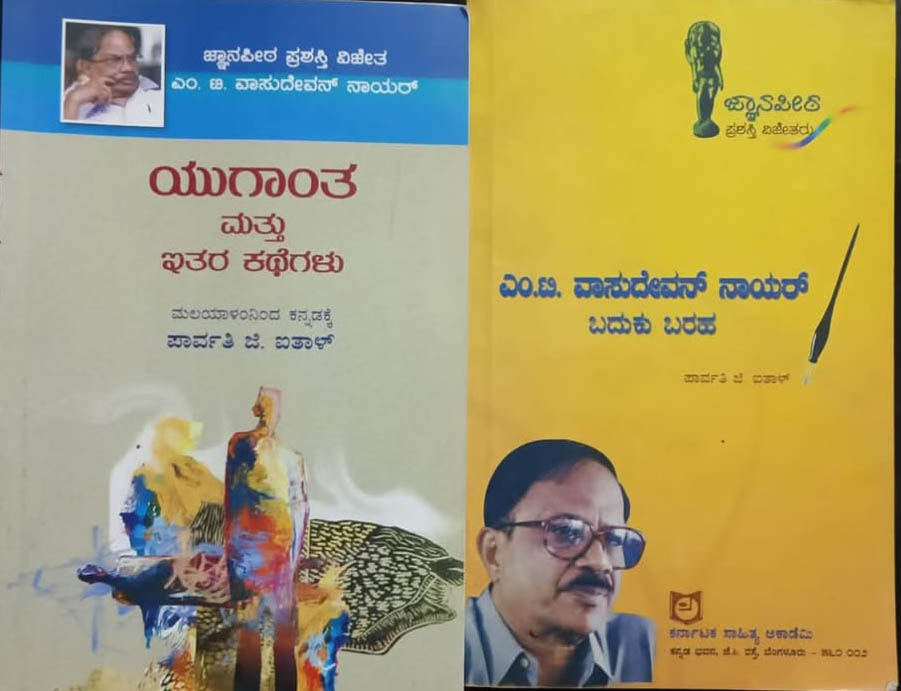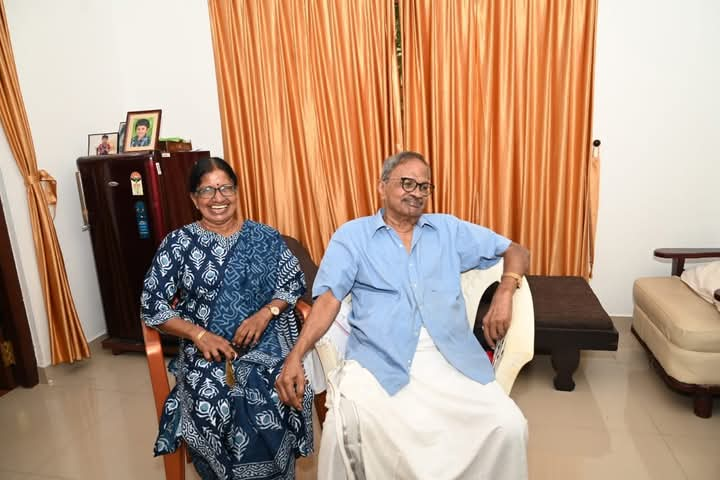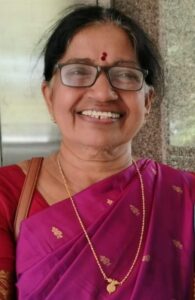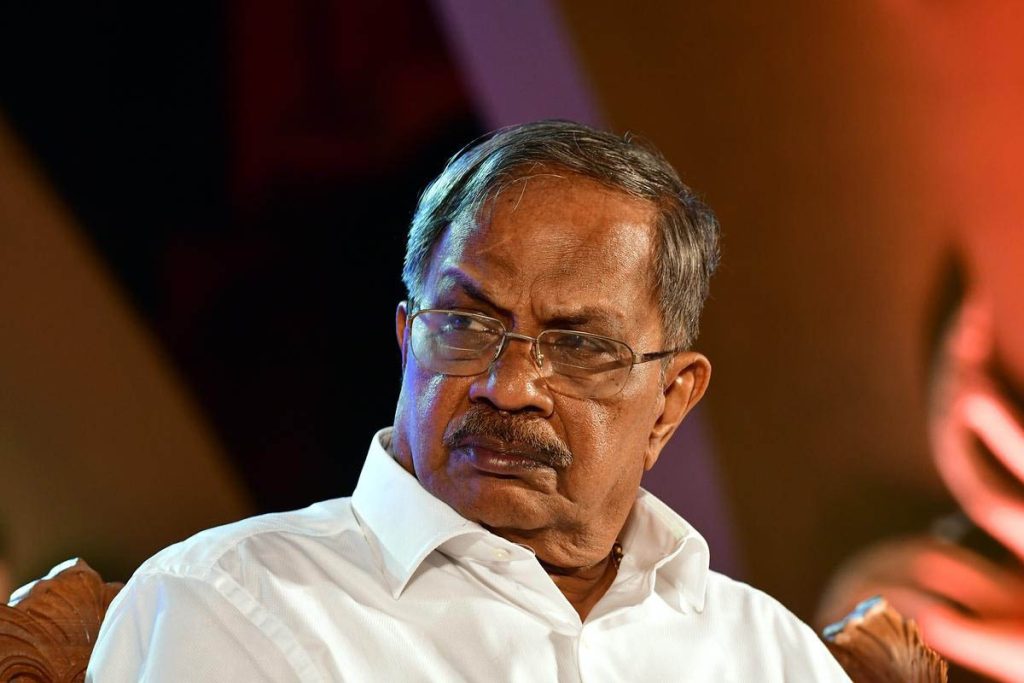‘More than all the Mahanadi’s which are unknown to me I love the Nila river which flows before me’ said the accomplished, consummate author – litterateur M.T. Vasudevan Nair who passed away recently at the age of 91. He was a colossal figure in the field of literature and cine’ world in Malayalam. Naturally his achievements had culmination and well-merited recognition with Jnanapith in 1995 followed by umpteen other prestigious awards, laurels and accolades.
Vasudevan Nair was born on 15th July, 1933 in a village called Kudallur in Ponnani Taluq of Kozhikode district (North Malabar region). His mother’s name was Ammalu Amma and father’s was T. Narayanan Nair. The last among the four male children of his parents, Vasu was very obstinate and stubborn. Whatever he wanted to do, he insisted on getting it done immediately. His mother used to say: ‘Vasu sometimes irritated me with his obstinacy. I always prayed to God to soften. He changed after he started going to school. He began to feel that he should study well and obtain good marks. Now he has mellowed like anything. ‘When he saw his brothers going to school, he was pertinacious to go with them. So he was admitted to the nearby hut-school, earlier than his age. ‘He need not do any reading or writing. If he sits there till 4 o’clock Amma will be free for some time’ was the purpose of others. But Vasu had changed completely. He was very serious about studies.
Vasu’s actual education started in the primary school of Malamakkavu. By that time he had made by heart all the lessons of first and second standard. Therefore the masters gave him direct promotion to fourth standard. In 1942, at his age of 12 he joined first form in Kumaranellur High school. He passed his S.S.L.C. examination with first class in 1947 when he was 14 years old. But in those days to join college one should have completed 16 years. Therefore Vasu had to stay at home without doing anything for two years. It was a blessing in disguise for him. It gave an opportunity for his writing talent to bloom and blossom.
Vasu’s father Narayanan Nair had passed his matriculation. He had worked as a teacher for some time and then he went to Ceylon to work as a clerk in a Trading Company. After some time he started a company of his own. Vasu’s mother had been born and up in an old prestigious household called Thekkepatt. She had learnt writing on the floor from the ‘Aashaan’ (village master). As she was growing with her friends learning songs and clap-dancing, Narayanan Nair married her and took her away to Ceylon with him. But she did not want to remain there after the children were grown up. She wanted to bring them to native and teach Kerala language and culture. So Vasu’s father brought them to Kerala and went back alone. Only occasionally he used to come home. Therefore Vasu did not have good contact with his father. Mother found it difficult to manage the family with the meagre money sent by her husband. The memories of childhood spent in utter poverty could be seen unravelled in Vasudevan Nair’s early stories and novels.
Vasu did not have sisters. This void was filled in by his eldest brother Govindan Nair’s wife Madhavikutty. When his brother was married, Vasu was a ten year old boy. Madhavikutty became his elder sister as well as friend. He used to call her ‘Oppu’ (sister). During holidays Vasu, Oppu and Govindan Nair used to play ‘Aksharashloka’ (a kind of Anthyakshari using only the verses from epics). For the same purpose they had made by heart verses from Sahitya Manjari, Shreekrishna Charithe, Manipravala and other epics. This, in fact, triggered his spirit to write poetry.

Those were the days of teething troubles for them. Due to their straitened financial circumstances it was very difficult to get books to read. Once they got a manuscript of the famous poet Changappuzha’s poetry called ‘Ramanan’ which they had to return immediately. Therefore Vasu, Govindan Nair and Oppu sat feverishly through day and night to prepare another copy of it. After that Vasu’s craving for writing poetry was intensified. He wrote a number of poems. However, it did not satisfy him. He realized that poetry was not his cup of tea.
Then he was fascinated towards the stories of the great writer S.K. Pottekkat. It made him turn his attention to writing stories. His Oppu Madhavikutty remembers: One day he told me he has written a story and he asked me to go through it. I read it and found that it was a very interesting and well written story. I told him we could send it to some weekly. Accordingly he did it. After two weeks or so he came to me with a rolled paper in his hand. He softly told in my ears that his story has been published in it. When he said so his face was glittering with joy. I too took part in his celebration and told him: See Vasu, you should not stop here. Keep writing. One day you will become a great writer. Our blessings are always with you. ‘Thereafter reading and writing became a penance for him. He has fulfilled our wish and has become the great Vasudevan Nair.’
In 1949 Vasudevan Nair joined Victoria College of Palakkad for his B.Sc. degree course. He took Chemistry as his major subject. When he was in final year his mother fell seriously ill. She was taken to Madras for treatment. But she did not survive. The news of her death was hidden from Vasu because it was the time of his final examination. After finishing his last two papers, when he came home he was sympathetically treated by everybody as ‘an orphan child’. As he stood holding the rods of the window staring at his mother’s tomb, his brothers did not know how to console him.
Vasudevan Nair passed B.Sc. examination in 1953. His first anthology of short stories ‘Raktham Puranda Mantharigal’ (sand particles smeared with blood) had already been published when he was a degree student. Immediately after his graduation he joined the Pattambi Board High school as a Mathematics teacher on a temporary basis. At that time his salary was Rs.69/-. The following year he worked at Chavakkad Board High school for some time.
After that he joined M.B. Tutorials at Palakkad for a better salary. The owners of that institution were running a monthly magazine called ‘Malayalee’. It became an outlet for Vasudevan Nair to publish whatever he wrote. He published his first novel ‘Paadiraavum Pagalvelichchavum’ (Midnight and Daylight) in it. By that time people had already started calling him for speeches. It helped him develop the talent of public speaking.
While working at M.B. Tutorials Vasudevan Nair tried for a government job in one or two places. But it was of no use. In the meanwhile his story ‘Valarthu Mrigangal’ (Domesticated Animals) received first prize in an International story writing competition organized by the famous Malayalam newspaper ‘Mathrubhumi’. As a result, he got a job as sub-editor in its weekly edition. In 1962 he married Prameela, a writer by herself. After 14 years of living together, due to unavoidable reasons they got separated. They had a daughter called Sithara. She has done her M.B.A. and is settled as a business executive in America. Vasudevan Nair married again a dancer called Kalamandalam Saraswathi. Their daughter Ashwathi and her husband Shreekanth also are classical dancers.
Vasudevan Nair served Mathrubhumi Weekly for 25 years. In 1981, hurt by some unpleasant incidents, he resigned from the post and dedicated his full time to writing. After a few years Mathrubhumi once again requested him to come back as an honorary editor.
The novel ‘Nalukettu’ (Quadrangular Courtyard House) which Vasudevan Nair wrote at the age of 23 drew the attention of the rereaders. Its theme was crumbling matrilineal joint family household in Kerala. In it there appeared the first of his rebel protagonists Appunni struggling with that degenerating system. The novel became very popular and bagged the Kerala Sahitya Akademi award too. Nostalgia was a part of his novellas too. The novellas like ‘Ninde Ormayku’ (To your memory) Olavum Theeravum (Waves and Coast,) Iruttinde Athmavu (The Soul of Darkness) Kuttyetatti (Sister Kutti) and novels like Asuravitthu (The Demon Seed) Manju (Mist) and Kaalam (The Time) rekindled the memories of his childhood transporting himself to his native village, towing the readers with him. He recreated the topography of the river Nila, its banks and the hues of the verdant and green paddy fields that stretched beyond. He summoned story after story whose characters, situations and crises became part of the psyche as much of the average Malayalee reader as of the intellectuals. His literature raised new waves in Malayalam literature and had an amazing impact on the readers through their moving narrative style. His stories ran around poor suffering people and the exploited. They were powerful enough to make the readers identify themselves with the characters and their surroundings. They had a mesmerizing effect on the readers. Vasudevan Nair became popular among the people of Kerala with the initials of his name as M.T.
M.T. entered the film world by writing a screenplay based on his own story ‘Murappennu’ (a girl on whim you have right). In 1973 he wrote a screenplay for ‘Nirmalyam’ and directed it also for which he received the prestigious Swarnakamala award. It earned several awards at the International film festivals too. His next film ‘Kadavu’ which came out in 1992 also received equal accolades. On the whole he wrote 52 screenplays. The solid essentiality of his screenplays made them outstanding among the other productions of the industry. Their language has the capacity to create their own social and historical background in the atmosphere of each story. The language of his screenplays is so artistic that it could bring together the life of both rural heritage and modern life style in a single click. His films are a perfect audiovisual chain which could be understood by undergoing the experience oneself. He has been able to touch the depths of human internal self. Vasudevan Nair has not only travelled widely all over India but most of the foreign countries too. He had been to Rassia, Finland, Germany, America, Japan, Hong Kong, Kazakistan, Dubai, Abudabhi, Sharja, Muscat, Ceylon and China to give lectures, present papers and participate in seminars. He has written travelogues also.
The entire gamut of his literary works include 8 novels, 18 anthologies of short stories, 3 children’s literature, 3 literary studies, 2 essay collections, 3 travelogues, one drama and 52 screenplays. Through translations he is familiar to the readers of several other languages.
Vasudevan Nair has never joined any political parties or organisations. He had worked for some publications like West coast Books, Classic Book Trust and has established a film production institution called Novel Films. But he was not seen on high positions. In Pune Film Institute, he has worked for four years as a guest lecturer.
Apart from serving the fields of art and literature, he had given himself to social service also. He has opened an office in Kozhikode where a large number of needy people come asking for help. He used to help them financially or by giving advice or suggestion without showing caste, religion or sex discrimination. Having experienced poverty during his childhood, he never hesitated to help the poor students by extending financial assistance.
During 1990’s once when he went to England, he visited Shakespeare’s memorial built at Stratford upon Avon. He became emotional to see the people’s love and respect for their great poet which they had expressed by neatly arranging all the literary works and other things belonging to him in order to keep him alive for the benefit of the future generations. Suddenly the idea of building a similar monument for the paterfamilias of modern Malayalam language Thunjatthu Ezhuthacchan. By the time he came home, the government of Kerala had been planning to build the memorial at Thirur which was the birth place of Ezhuthacchan. They formed a committee for it and made Vasudevan Nair its president. Under his leadership a very beautiful and bewitching artistic memorial was built for Ezhuthacchan with greenery all around, a Saraswathi Mantapam, large library, an elaborate museum representing Kerala cultural history, a spacious meeting hall and a number of cottages for the visitor’s stay during literary seminars and conferences. Every year during February, a four-day national literary seminar is organised for which eminent writers from all the regional languages of India were invited to participate. Vasudevan Nair took personal interest in it though a few years ago the Central Sahitya Akademi has taken its responsibility. In spite of his poor health due to old age Vasudevan Nair gave regular visits to this place.

Myself, the author of this article, had a very good contact with M.T. Vasudevan Nair since 1999. My first translation from Malayalam, a novel titled ‘Badukalu Maretha Sthree’ (the famous writer Vettor Raman Nair’s ‘Jeevikkan Marannupoya Sthree’) was released by him at Thrissur Kerala Sahitya Akademi Hall on 12th August 1999. Though I had read his stories and novels in Kannada translation when I was a student at Govt. College Kasaragod, I saw him for the first time only on that day. I was very much thrilled to share the dias with him. He spoke to me in a very friendly manner. After I came back home I wrote letters to him for which he replied every time. Later I translated two of his novels (Asuravitthu as Durbeeja and Manju as Manju) and two anthologies of short stories. I wrote his monograph which was published by Karnataka Sahitya Akademi. I went and stayed in his house ‘Sithara’ and spent a day with his family. He also came to our house once when he came to Kollur for the shooting of his film ‘Theerrthatanam’. Whenever I wanted to ask for his advice or suggestion I used to call him over the telephone. It was very painful to hear about the end of the beacon light of Malayalam literature on 25th December 2024. I am sure that he would remain in our memories with his literary works and his humanitarian concern which he showed to all throughout his life.

Dr. Parvathi G. Aithal

